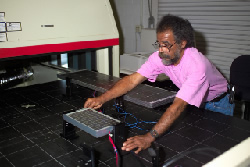 |
Leighton "Demi" Demetrius sets up a photovoltaic panel for testing in the Spire Solar Simulator.
(Photo: NIck Waters) |
The tremendous growth of the photovoltaics industry in the past few years has spurred interest in the development of national standards to assure that consumers get the quality and performance promised by manufacturers.
The Florida Solar Energy Center, in association with Sandia National Laboratories, has been in the forefront of these developments and is playing a leading role in product certification standards. FSEC has been certifying solar thermal products and systems made or sold in Florida since the early 1980s. Since September 18, this testing and certification now extends to PV modules and systems as well.
"It's hard to believe what's going on in this industry these days," said FSEC's Kevin Lynn. "We've been working with industry for some time to put together PV product certification standards, and now the announcement that federal tax credits for PV systems will begin in January has really set things in motion."
On a national level, FSEC has been working with Underwriters Laboratories, PowerMark, the California Energy Commission, Interstate Renewable Energy Council, Arizona State University and other groups to encourage a national performance certification for PV components and systems, beginning with PV modules. Such a program will help state and federal rebate programs be sure they are getting the most from their money for the subsidies they provide, since most of these programs are based on module manufacturer rating (e.g., x number of dollars per watt).
A meeting was held last week in Washington, D.C., to bring together the stakeholders involved in PV certification to establish a national working group to represent the PV product certification interests, develop and promote consensus guidelines and recommendations on nationwide certification, and create a resource for certified PV equipment and systems and applicable information (the January issue of the Energy Chronicle will update these efforts).
Lynn noted that FSEC has made specific strides in PV system certification as well, both within Florida and on a national level. As a result, several PV manufacturers and distributors have sent more than 100 systems for acceptance.
Two programs of note that are requiring system acceptance is Florida's "PV for Schools" program and the USDA's Rural Utilities Service.
The State of Florida's Department of Environmental Protection has budgeted $400,000 for FY 2006 to subsidize the installation of grid-connected, photovoltaic systems on schools. The program will support two types of systems: small demonstration sites and larger disaster shelter systems. In order for manufacturers to participate, they must submit complete packaged systems for review and acceptance.
The new certification will also be used by the U.S. Department of Agriculture's Rural Utilities Service (RUS), a national program that services co-ops. The RUS Electric Program has announced that they are considering offering low-interest loans for PV systems used for grid-connected applications without battery storage and off-grid livestock water pumping without storage. FSEC and Sandia National Laboratories are working with RUS in developing the standards for this program.
As the PV industry continues to grow, FSEC's certification program will become even more important to users of the technology. Including PV in the FSEC testing and certification program is a move whose time has come.
